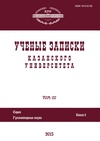МАРКЕРЫ КОНФЛИКТНОСТИ В РУССКОМ МЕЖЛИЧНОСТНОМ ДИСКУРСЕ
CONFLICT MARKERS IN THE RUSSIAN INTERPERSONAL DISCOURSE
Author(s): Ilsoyar SadykovaSubject(s): Applied Linguistics, Psycholinguistics, Eastern Slavic Languages, Philology
Published by: Казанский (Приволжский) федеральный университет
Keywords: markers of conflict; conflict discourse; ethno-speech prohibitions; socially relevant signs; conflict talk; statements-corrections;
Summary/Abstract: This paper develops the studies aimed at investigating discourse markers of conflict talk in the Russian language. It was suggested that the discourse markers used in conflict talk determine communication and can change the interlocutor’s speech in case if ethno-speech prohibition, a type of communicatively meaningful silence, is violated. The purpose of the research was to determine the composition of linguistic units, which, in their content, represent direct or indirect rationale for communicative intervention in conflict talk. Statements-corrections can refer to socially relevant signs of either subjects of communicative correction (snotter, buster, etc.) or objects, towards whom the communicative rules of silence are violated (mother, father, senior, etc.). The suggested approach enables a claim that conflict markers indicating socially relevant signs of interlocutors can simultaneously perform the following two functions: firstly, they can serve as a way of self-identification of a person involved in conflict talk; secondly, they represent an explicit means of verbal regulation of the communicative behavior if a person violates the conventionalized norms of silence in social opposition “senior” ↔ “junior”. The results of the analysis can contribute to the study of the phenomenon of conflict talk in the Russian language.
Journal: Ученые записки Казанского университета. Серия Гуманитарные науки
- Issue Year: 161/2019
- Issue No: 5-6
- Page Range: 127-137
- Page Count: 11
- Language: Russian

